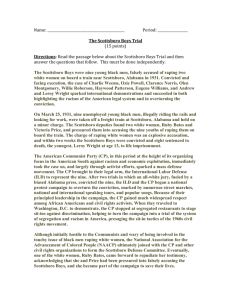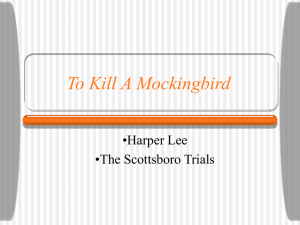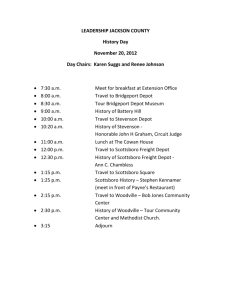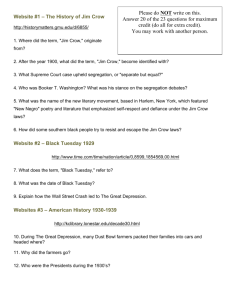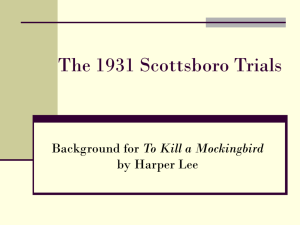Partly done Complete Outline
advertisement
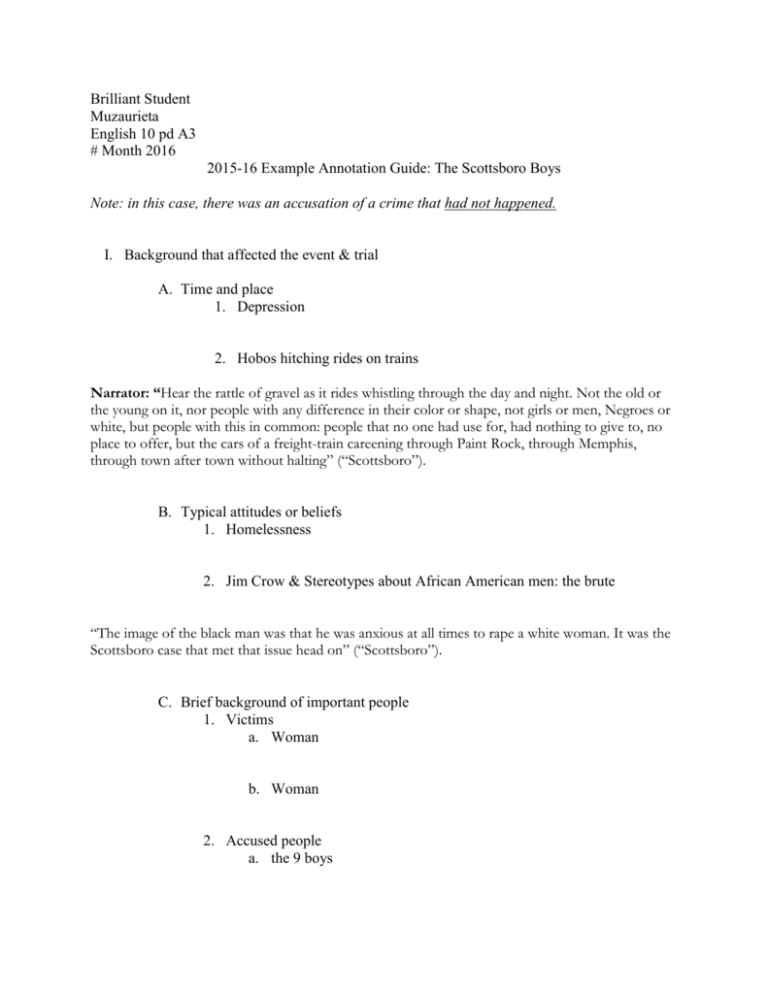
Brilliant Student Muzaurieta English 10 pd A3 # Month 2016 2015-16 Example Annotation Guide: The Scottsboro Boys Note: in this case, there was an accusation of a crime that had not happened. I. Background that affected the event & trial A. Time and place 1. Depression 2. Hobos hitching rides on trains Narrator: “Hear the rattle of gravel as it rides whistling through the day and night. Not the old or the young on it, nor people with any difference in their color or shape, not girls or men, Negroes or white, but people with this in common: people that no one had use for, had nothing to give to, no place to offer, but the cars of a freight-train careening through Paint Rock, through Memphis, through town after town without halting” (“Scottsboro”). B. Typical attitudes or beliefs 1. Homelessness 2. Jim Crow & Stereotypes about African American men: the brute “The image of the black man was that he was anxious at all times to rape a white woman. It was the Scottsboro case that met that issue head on” (“Scottsboro”). C. Brief background of important people 1. Victims a. Woman b. Woman 2. Accused people a. the 9 boys 3. Important officers? 4. Lawyers? II. Details of the event/crime: A. Time and place “On the morning of March 25, 1931, a freight of the Southern Rail Corporation left Chattanooga, Tennessee bound for points west. Scattered among the cars of the freight were some two dozen hoboes -- black and white. A few minutes out of Lookout Mountain, the train dipped into the Northeastern corner of Alabama” (“Scottsboro”). B. Exactly what happened 1. the fight MILLS THORNTON, Historian: “As the train emerged from the tunnel under Lookout Mountain, a group of whites was moving along the top of the train and they stepped on the hand of one of the blacks and almost knocked him off the train. The hand belonged to an 18 year-old named Haywood Patterson, who was on his way to Memphis to look for work” (“Scottsboro”). Voice of Patterson: “We was just mindin' our own business, when one of them said, 'This is a white man's train. All you Nigger bastards unload.' But we weren't goin' nowhere so there was a fight. We got the best of it and threw them off. Word of the fight reached the tiny town of Paint Rock, Alabama, where the train was scheduled to stop and take on water” (“Scottsboro”). 2. the “raid” on the train JAMES GOODMAN, Historian: “In Paint Rock news goes out that there is a gang of Blacks, a gang of Negroes on the train that beat up a gang of Whites. A posse is organized. Virtually every man in Paint Rock with a gun or a rope shows up. The train stops. The posse goes up and down the train looking in all the cars” (“Scottsboro”). FLYNT: “What they thought they were gonna find is a group of blacks who had beaten up a group of whites and thrown them off the train. Immediately unexpected things began to happen. That's what you most fear in a racial confrontation is the unexpected” (“Scottsboro”). 3. what the young women said and why FLYNT: “Suddenly, from the shadows of a box-car, emerged two white women: pale and disheveled” (“Scottsboro”). DAN CARTER, Historian: “At first they weren't even aware that they were women. They were wearing overalls. They identified themselves as Victoria Price and Ruby Bates. And there are conflicting accounts about who said what, when. But one of the young women said, 'we've been raped. All those colored boys raped us.' And that was it” (“Scottsboro”). 4. the arrests CLYDE BARCLAY, Paint Rock Resident: “A bunch of people here got the guys off the train, marched them up here about where this old building, right across from where the white wrecked car is there -- lined them up against the wall there” (“Scottsboro”). BILLY O’NEAL, Paint Rock Resident: “I saw a lot of people surrounding those boys, many of them having guns of course and ropes or pieces of rope. They were intent on mayhem” (“Scottsboro”). STEVENSON: For any black man in Alabama whenever you saw a group of white men with guns in the menacing ominous way in which people were collected in Paint Rock, Alabama, you knew you were in a lot of trouble” (“Scottsboro”). “There were nine prisoners in all. One of them was 19 year-old Clarence Norris” (“Scottsboro”). Norris, audio: “The place was surrounded with a mob. They had shotguns, pistols, sticks, pieces a' iron, everything. The crowd commenced to hollerin' let's take these black son-or-a-bitches up here and put 'em to a tree. I just thought that I was gonna die. Clarence Norris” (“Scottsboro”). III. Immediate results of the crime A. Police actions/investigation B. Media coverage C. Public reaction D. Threats of violence against boys (lynching) E. Support of the boys? IV. Details of the trial A. Highlights of prosecution B. Highlights of defense C. What made it unfair D. Verdict and sentence E. Crowd behavior & beliefs V. Immediate results of the trial A. Media coverage? B. Public reaction? Protests? C. Complications? VI. Ongoing events related to the trial A. highlights of the appeals process B. later events which occurred as a result of the trial (for example, protests)? VII. Long-term effects of the event/crime/trial A. Laws created or legal changes? B. Updates over the years? VIII. Lessons about pride and shame
